The human mind is an intelligent and beautiful machine that is full of complex yet fascinating psychological effects, phenomena and paradoxes. How many do you know about?
Human psychology can help us better understand how our mind works and how it affects our thoughts, decisions, emotions, perceptions, behaviors and actions, whether consciously, subconsciously or unconsciously. The more we know about the different brain-twisting and mind-boggling paradoxes, the better we will be able to control our mind and achieve personal development.
So here are 10 psychological effects that you may have never heard of, but should know about for optimal brain function –
Psychological Effects You May Not Know About:
1. Audience Effect
The audience effect is a form of social facilitation which involves the psychological tendency of an individual to perform better or worse when working in front of other people (an audience) rather than when performing alone. However, this tendency can even be observed when other people are simply present in the environment, instead of only working with them. A 2016 study explains “An audience effect arises when a participant’s behaviour changes because they believe another person is watching them.”
Social facilitation shows that we tend to perform simple tasks with more accuracy and efficiency when we are in front of an audience than alone. Conversely, we may perform poorly and ineffectively when completing a complex task in the presence of an audience than alone. This phenomenon is identified as social inhibition. According to the American Psychological Association (APA), the presence of bystanders can strongly influence behavior, not just in humans but also in different animals like non-human primates, birds, fish etc.
Related: 16 Weird Mind Tricks Your Brain Plays On You
2. Curse Of Knowledge
This is one of the most common psychological effects that most of us experience, particularly in educational and professional settings. According to a 2020 study, it is a psychological phenomenon where “an expert struggles to recreate the state of mind of a novice.” This cognitive bias takes place when we presume that someone possesses the background knowledge about a particular topic to understand when communicating with them. Also known as the curse of expertise, it is a subconscious assumption that makes it difficult for someone to properly assess the behavior of others.
This mental bias reveals that we are unable to “unlearn” or disregard what we already know. It is often experienced by teachers, trainers and other experts as they can find it hard to explain a subject to someone who lacks the same level of knowledge. The curse of knowledge can affect a person’s communication, empathy, creativity, productivity and personal growth. “Knowledge can be a curse: Once we have acquired a particular item of knowledge it tends to bias, or contaminate, our ability to reason about a less informed perspective,” explain researchers.

3. Birthday-Number Effect
Do you prefer the number of your own birthdate over other digits? If yes, then you experience the cognitive bias known as the birthday-number effect. It is a subconscious mental tendency that makes us choose the numbers in our birth date more than any other number. Originally studied by Japanese psychologists Shinobu Kitayama and Mayumi Karasawa in 1997, this is one of the psychological effects that are observed in people across the globe. However, this tendency may be influenced by your personality, gender and age.
As our birthday is fundamentally associated with our sense of self, we tend to prefer the numbers in our birthday. However, individuals who have poor self-esteem, lack self-love or hate themselves may not experience the birthday-number effect. This phenomenon is associated with another similar bias known as the name letter effect, where a person prefers the alphabetical letters in their name, especially initials, and believes that such letters or alphabets are lucky. Such mental tendencies can often affect our real-life decisions.
4. Google Effect
Also known as digital amnesia, it is a mental tendency to not remember or forget facts, data and others that can be found easily through online search engines, such as Google or Bing. As the information can be accessed readily, we do not prefer storing the information in our memory. This effect was first reported in a 2011 study where the researchers explained that “The Internet has become a primary form of external or transactive memory, where information is stored collectively outside ourselves.” The study found that when solving difficult problems, we are “primed” to consider “Google” and when we know we can easily access the information in future, we are less likely to recall the information itself and more likely to recall where to access it instead.
However, this does not mean that our ability to learn and retain information offline is affected. The Google effect is more about the kind of information and level of detail we believe to be important enough to remember. Regardless, it can create an unnecessary dependency on technology which may negatively affect our intelligence and memory.
Related: 25 Interesting Psychological Facts You Didn’t Know About Yourself
5. Tamagotchi Effect
It is one of the most common psychological effects that you probably haven’t heard of yet but have probably experienced. A person experiencing this psychological tendency tends to develop emotional attachment and bonding with a machine, device, robot or other digital agents. This phenomenon is named after the Japanese toy Tamagotchi (roughly translated as “egg watch”), which is a handheld virtual pet released in 1996. “The Tamagotchi, a handheld egg with a digital screen that one had to feed and take care of, can probably be considered the precursor of the artificial pet movement in 1996,” explains a 2015 study.
This effect can be experienced by anyone as humans are wired to develop attachment with anything that we can relate to. The Tamagotchi virtual pets involve Artificial Intelligence (AI) which mirrors human personality, behavior & emotions. Hence, this psychological phenomenon is observed more in people who are introverts, shy or have difficulty communicating openly.
6. Zeigarnik Effect
Do you tend to remember the details of a task that was left unfinished due to interruption? According to psychology, we are more prone to readily recall a partially completed activity that was interrupted. Named after Bluma Zeigarnik, a Lithuanian-Soviet psychologist, it was found that task interruption can improve our ability to remember it later, rather than reduce it. This is one of those psychological effects that are associated with our memory. This tendency allows us to remember interrupted or unfinished tasks better than the ones that were successfully completed.
This phenomenon is commonly observed in soap operas or serialized comic books where they use a cliffhanger to make the audience eager for the next episode or issue. However, the Zeigarnik effect is different from the Ovsiankina effect, which refers to our inclination to restart a task at the latest opportunity after being interrupted. “The Zeigarnik effect is well known in psychology. It consists in the fact that incomplete actions are remembered better than complete ones,” explains one study.
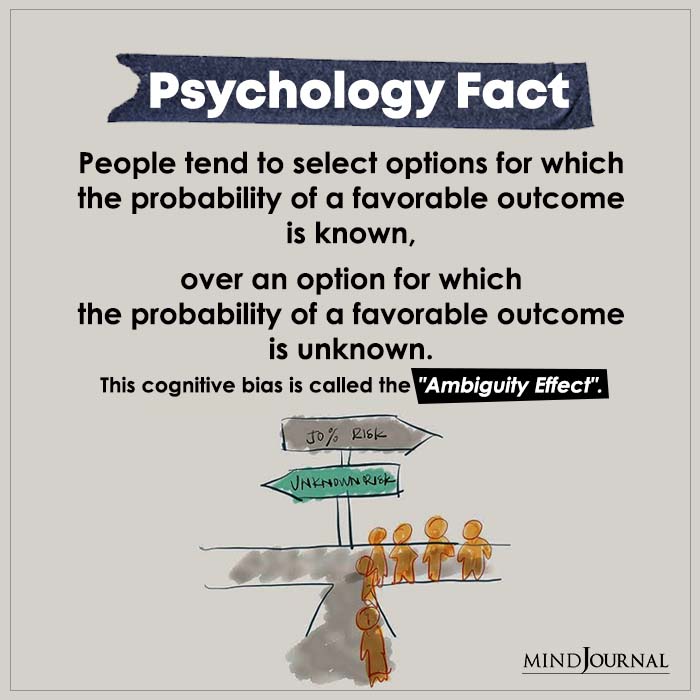
7. Baader-Meinhof Phenomenon
Also known as frequency illusion, it is a type of availability bias where we overestimate the probability of specific events when it readily appears in our mind. Hence, something seems to get noticed more often after you have learnt a new information or noticed something the first time. It makes you believe that the thing has a high frequency of occurring.
One 2019 study explains the Baader-Meinhof phenomenon as a cognitive bias (a systematic deviation in thinking) that occurs “when one has a new experience or learned something new and suddenly one begins to encounter it more frequently, even if it has been there all along.” It is believed that the phenomenon involves two distinct processes –
a. Selective attention bias: Observing information or things which are important to us while ignoring the rest.
b. Confirmation bias: Seeking information which supports our beliefs and perceptions while avoiding existing evidence that may counter our beliefs.
Related: 15 Common Cognitive Distortions That Twist Your Thinking
8. Tetris Effect
Also called the Tetris syndrome, this psychological phenomenon occurs when we focus our attention on a specific activity for long periods of time and it starts to affect our thought patterns, perceptions, dreams and mental visual imagery. The name is derived from the popular video game called Tetris. It was observed that players, who played the game for extended periods of time, observed shapes and forms in the real world which can be arranged and placed together, similar to the game. They also experienced hypnagogic imagery and saw colored shapes moving around while on the brink of sleep. This showed that the minds of the players kept playing even after they had exited the game.
Among all the psychological effects, this is perhaps the most bizarre as it is influenced by playing a game, where the person is unable to consciously prevent such thoughts, dreams or mental images from occurring. In fact, studies have found that playing tetris can help to reduce intrusive memories after a traumatic experience. “Tetris has been proposed as a preventive intervention to reduce intrusive memories of a traumatic event.” explains a recent 2020 study.
9. Hot-Cold Empathy Gap
Also known simply as the empathy gap, it is a cognitive bias where we tend to underestimate the impact of mental states on our behaviors, attitudes, preferences and decision making skills and how they focus only on meeting our current feelings and state of being. Research shows that “people mispredict their own behavior and preferences across affective states.” When someone is in an emotionally “cold” state, they are unlikely to realize how “hot” states may affect their behavior and preferences. However, when in a “hot” state, they may underestimate the influence of such states and hence, “overestimate the stability of their current preferences.” According to a 2013 study, hot-cold empathy gaps occur as we tend to ignore or underestimate the influence of (mostly aversive) visceral factors that are presently not experienced, while making decisions.
When experiencing a visceral state, like intense feelings, drug cravings, thirst, hunger or sexual desire, we typically focus on goals related to our present state and devalue the significance of other goals. The study explains “when people are in an affective cold state (e.g., not experiencing thirst or craving at the moment), they do not accurately estimate how much such visceral states (hot states) will change their preference and behavior, hence the term hot-cold empathy gap.” For instance, a smoker, who is not craving a cigarette at the moment, may grossly downplay how greatly they may desire a cigarette when they enter a high craving state later. This cognitive bias reveals that our understanding is primarily “state-dependent.”
10. Spotlight Effect
When at a party, do you believe that everyone is staring at you? The spotlight effect may be one of the lesser known psychological effects but it is commonly experienced by individuals suffering from social anxiety. The spotlight effect is a tendency to assume that others observe and judge our appearance, behavior, flaws and mistakes more than they actually do. One study explains that “People overestimate the extent to which their actions and appearance are noted by others, a phenomenon dubbed the spotlight effect.”
This effect makes us overestimate the volume of people who notice us and makes us feel we are under a spotlight which highlights our faults. According to a 2002 study, “When people commit an embarrassing blunder, they typically overestimate how harshly they will be judged by others.” This mainly occurs as intrinsically we pay more attention towards our own selves than others but we tend to forget that that the same principle is applicable to everyone else. Regardless, this phenomenon can lead to a lot of social anxiety in individuals with this mental bias.
Related: 25 Amazing Psychological Facts That Will Boggle Your Mind
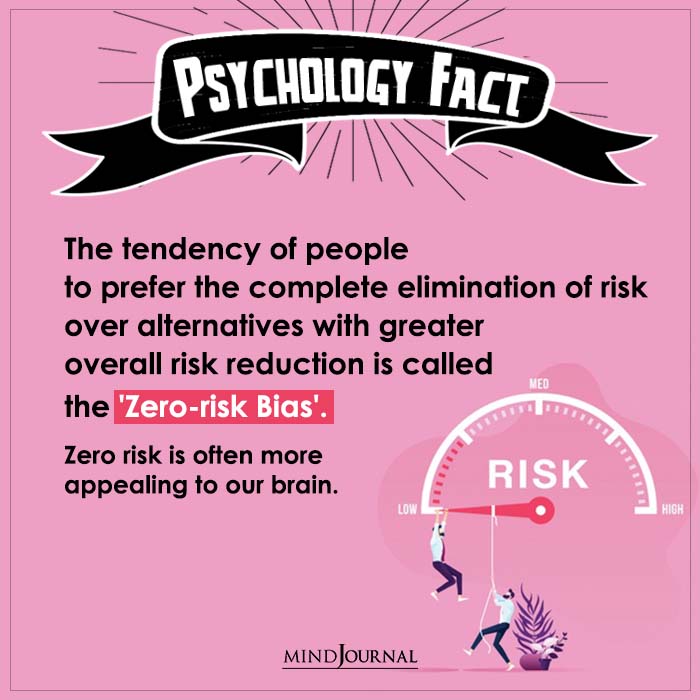
Here Are Some Other Lesser Known Psychological Effects
11. Bizarreness effect
Bizarre content and materials are better remembered and more easily recalled than common material, phrases or sentences.
12. Von Restorff effect
Also known as the isolation effect. An isolated incident, information or stimulus is more likely to be recalled than other homogeneous stimuli that don’t stand out.
13. Choice-supportive bias
A cognitive bias that involves a tendency to recall your choices as more effective and better than they were in reality after a decision has already been made.
14. Positivity effect
Older adults tend to prefer remembering positive material and information over negative ones in cognitive processing and memories.
15. Serial position effect
The tendency of people to better remember and recall items in the beginning or end of a sequence than the items in the middle.
16. Well travelled road effect
A cognitive bias where a traveller’s ability to accurately estimate the time taken to travel a route is influenced by their familiarity with that route.
17. Hawthorne effect
A form of reactivity where a person may alter or modify their behavior when they become aware that they are being observed or studied by others.
18. Less-is-better effect
A preference reversal where a person irrationally chooses the smaller, lesser or worse alternative when evaluating two options separately, but not together.
Related: 9 Surprising Psychological Facts About Love And Attraction
19. Word superiority effect
We tend to recognize letters faster and easier when presented in a word rather than when they appear as isolated letters or nonword strings (unpronounceable arrangements).
20. Verbatim effect
A cognitive bias which makes someone recall the gist of a conversation or information rather than the exact information or the verbatim wording as memory typically retains general meaning over exact details.
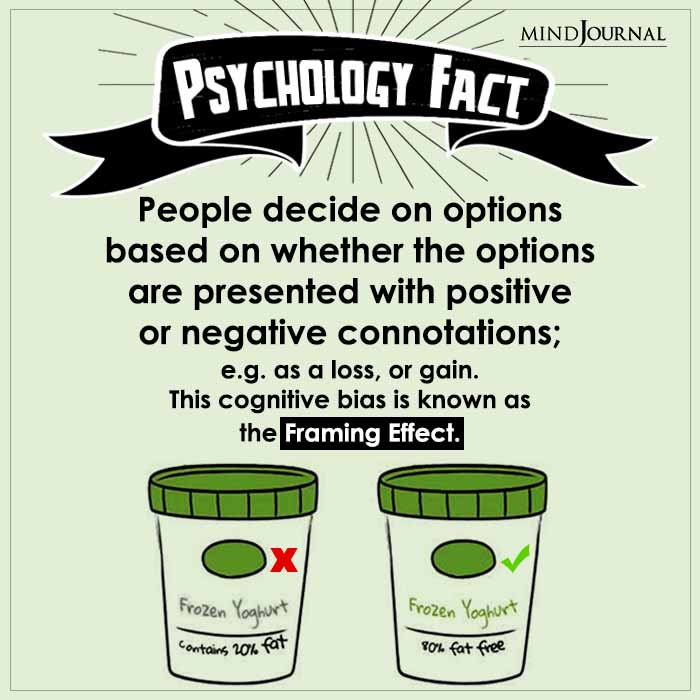
21. Reactance
A negative reaction or unpleasant motivational arousal (urge to do the opposite) to rules, norms or individuals when someone experiences a threat to their freedom of choice.
22. Cheerleader effect
Also known as the group attractiveness effect, a cognitive bias where individual faces are perceived as more attractive when in a group and flanked by other faces than when perceived in isolation.
23. Golem effect
One of the widely observed psychological effects in educational and organizational environments, a phenomenon where lower expectations from superiors (managers or teachers) can actually lead to poor performance in an individual as was originally anticipated.
24. Hedonic treadmill
A psychological tendency to quickly adapt back to a relatively neutral and stable hedonic level despite significant positive or negative events as good or bad experiences affect happiness temporarily.
25. Worse-than-average effect
Also known as the below-average effect, it is another cognitive bias where an individual underestimates their own abilities and accomplishments and assumes others are better than them.
So there you have it!
Can you relate to any of the psychological effects mentioned above? Which ones do you find the most interesting and fascinating?
Do let us know by leaving a comment below.
Related: 14 Useful Psychological Life Hacks To Get An Edge In Life




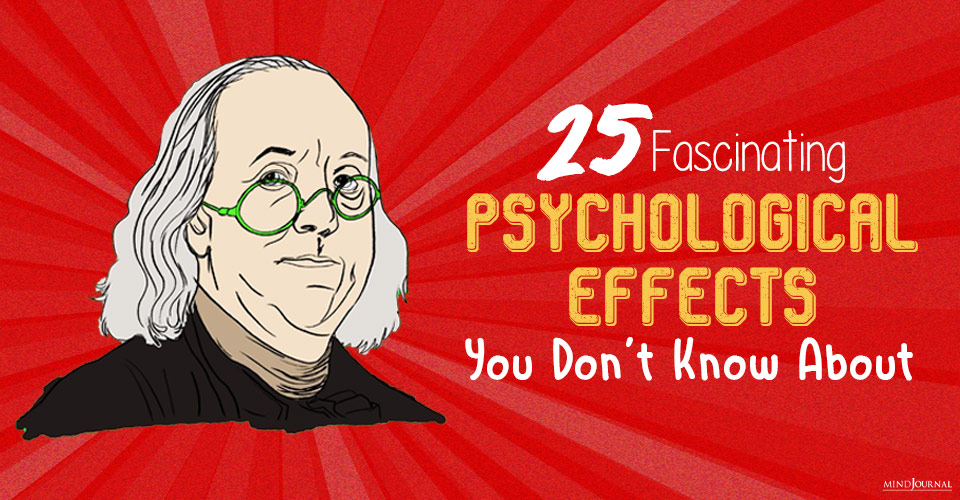
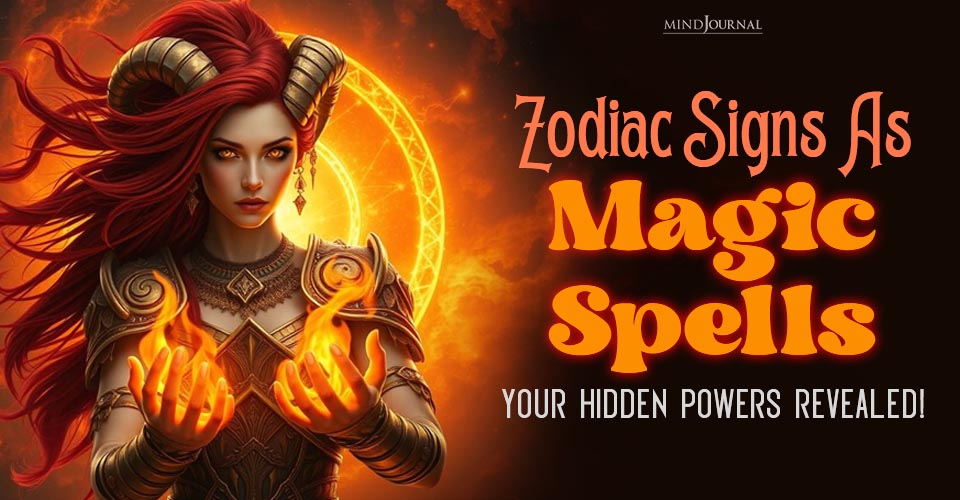
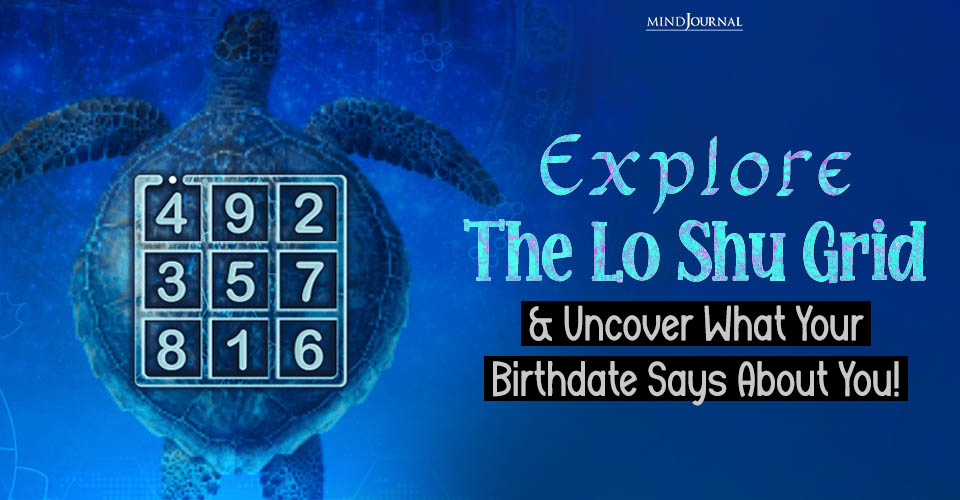
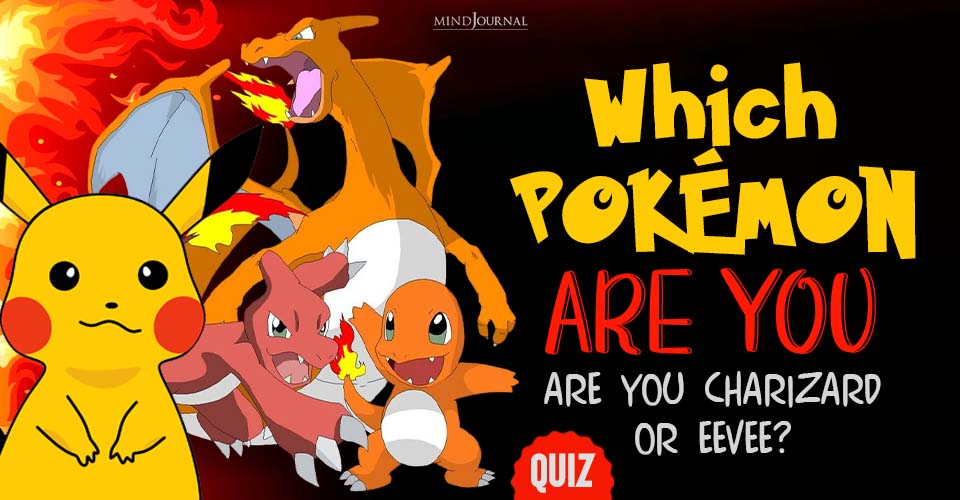

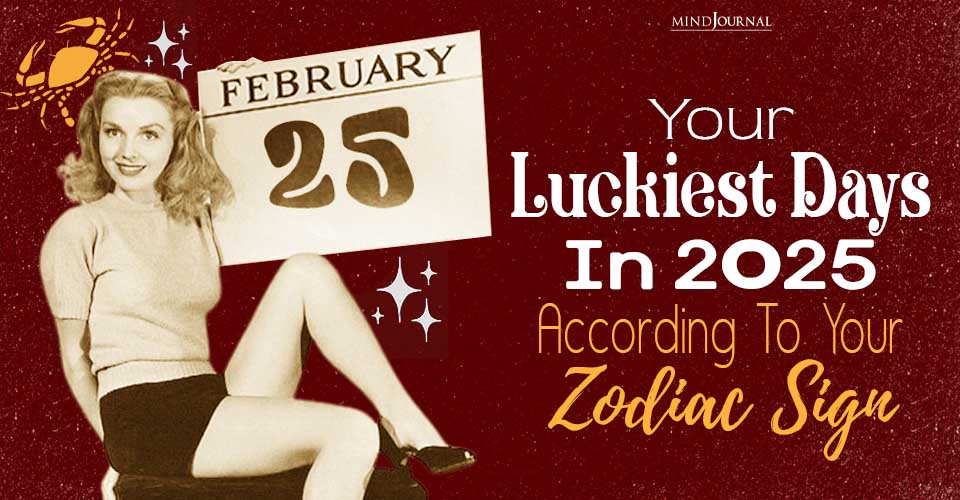


Leave a Reply